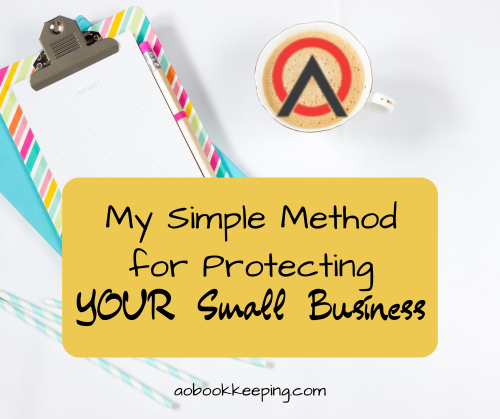
“Be your own boss, it will be amazing.” they said.
And at times it is. But most of the time you feel like you’re in over your head. Providing a product or service is your area of genius, but actually running the business? Not so much. Why are there so many tasks that need to be done? Invoicing, collecting payments, updating the books. And let’s not even get started on reconciling those books or the quarterly and annual tax documents…It can sometimes seem endless. And when you have no experience in doing it, it’s downright scary.
It is important to know and understand the basics of running a business. This is true even if you outsource the tasks to a professional. Hiring it out and not staying involved in the process is not a good idea. (Hiring it out is a great idea if you stay in the know.) The responsibility always falls to you, the business owner, and not the professional you hired. Remember, these people are only human. They make mistakes, forget to do things, and some will even break the law. If you understand the basics and keep a finger on the pulse of your business, you should be able to tell if there is a problem before too much harm is done.
Nothing seems to drive home a point better than real-life examples, and in our years of doing business, we have heard and experienced more than a few.
Now, just like the old TV show Dragnet… The names have been changed to protect the innocent.
Tom was a business owner who didn’t have the time to handle his accounting and payroll tasks. So, he turned to a professional to handle these duties for him. Everything seemed to be going great. His workers were being paid, his books were being handled and he was able to focus on his customers. He was thrilled that he no longer felt so overwhelmed.
Fast forward several months and Tom suddenly received a letter from the IRS. The letter stated that he was several months behind on remitting payroll taxes. He figured it must be a mistake and initially ignored the letter, a big mistake. Then he received a letter from the state, which said he was behind in remitting state unemployment tax. Now concern began to set in. He pulled his bank statements for the last several months and saw payments clearing routinely for what looked like the amount of payroll tax. He then pulled the bank statements from the period prior to outsourcing payroll. He noticed that the payments he made showed the name of the taxing authority on each payment line. When compared to the latest statements, he didn’t see this information on each withdrawal.
Tom then contacted his bank and asked for details of where the payments went. He found out the payments, over the last several months, weren’t being sent to the taxing authority, but rather the funds were being transferred to his accountant’s personal bank account. It gets worse…Tom owes the government for back taxes. The government isn’t concerned with Tom’s fraud story. As the business owner and taxpayer… He Is Responsible. But it doesn’t stop there. Since payments are late, he also owes late fees and interest that have been compounding each month. The new vehicle his accountant recently bought with cash; you guessed it; Tom paid for it! Even with legal prosecution, he may never see that money again.
His mistakes:
- He did not ask for payroll filing confirmations.
- He did not check his bank statements regularly.
- He did not keep a record of his log-in to the federal or state filing systems, so he could periodically check on his accounts.
- Upon receiving notice from the IRS of a problem, he did not immediately act.
Takeaways:
- Don’t be afraid to ask for filing confirmations. Or make it a habit to routinely log into the taxing authority site and review the dates of the filings made (see 3).
- Review your bank statements regularly. This shouldn’t take long, so do it!
- Always know your logins for all government websites. It’s not enough for just your accountant or tax preparer to know them. You must know them!
- Immediately act on any letter you receive from a state or federal authority.
Not every business has payroll. But that’s not the point. The point is, you don’t know what you don’t know. You don’t have to know all the ins and outs, but you do need to know the basics.
Remember, responsibility always falls on you. Not your accountant, not your tax preparer, not your attorney, not your employee. Always you. Protect yourself by learning the basics.
A little DIY can make all the difference in building a solid foundation for business success.
The article is for informational purposes only and should not be construed as business, accounting, tax, or legal advice. Details are subject to change without notice.
